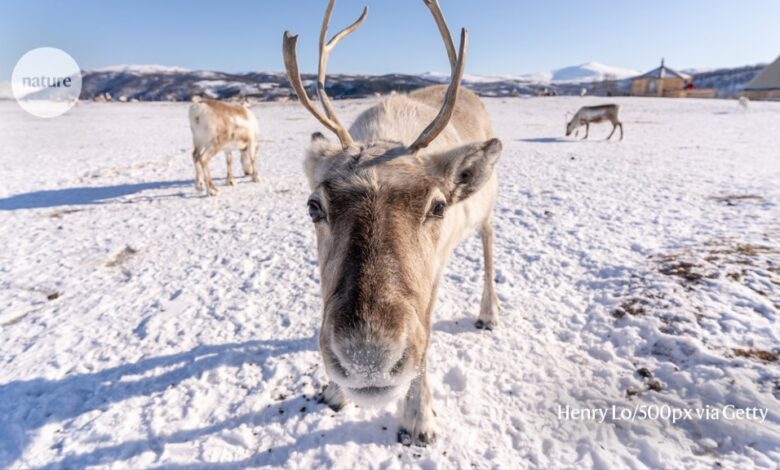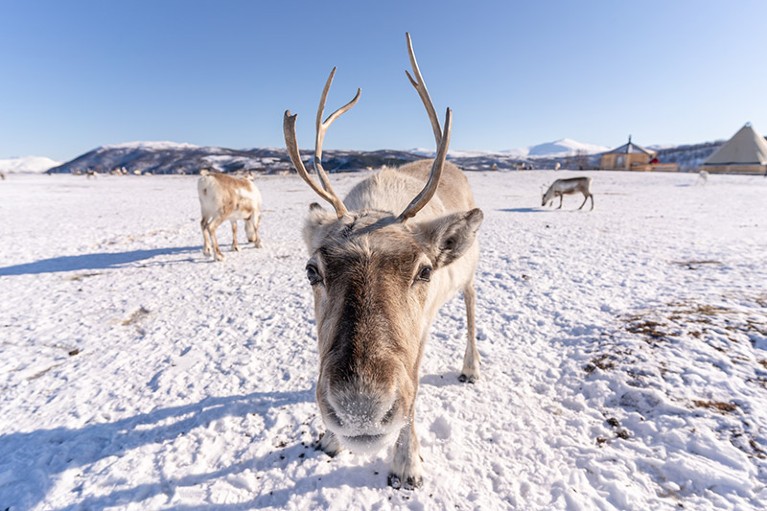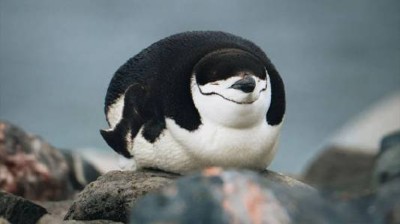
[ad_1]

Reindeer put their brains into sleep mode while they chew their food, cutting their need for deep sleep.Credit: Henry Lo/500px via Getty
It’s a long time since summer for reindeer in the Arctic right now, but those that gorged themselves during the bountiful months will be well equipped to survive the winter. A study released today in Current Biology1 reports that reindeer can put their brain into a sleep-like state while they chew, meaning that they are able maximize their eating time during Arctic summers.
“Reindeer can meet digestive and sleep requirements at the same time,” says Melanie Furrer, the study’s first author and a neuroscientist at the University of Zurich, Switzerland.
Like a cow, a reindeer has four chambers in its stomach, and it uses the first to store grass for later regurgitation and chewing — a process known as rumination.
The need for sleep
The researchers took electroencephalogram (EEG) recordings of captive Eurasian tundra reindeer (Rangifer tarandus tarandus) in Tromsø, Norway, tracking their brain activity during September’s autumn equinox, the summer solstice in June and December’s winter solstice.
They found that during rumination, the reindeer’s brains show an increase in slow waves and rhythmic bursts of activity — patterns that are usually associated with non-REM sleep. Despite not always having their eyes closed, ruminating reindeer also showed behaviours similar to sleep. They sat and stood quietly, and reacted less to noises produced by other reindeer.
The more they ruminated, the less actual sleep the reindeer seemed to need. When the researchers cut the reindeer’s usual sleep time by two hours by talking loudly, stroking them and enticing them with fresh food, the team observed an increase in slow-wave activity in the reindeer’s brains, suggesting an increased build-up of sleep pressure — the normal biological drive to sleep.
But if the reindeer ruminated, their subsequent sleep showed less slow-wave activity compared with reindeer that didn’t ruminate. “The need to sleep decreases across rumination. Most likely, this is the case because reindeer can ‘sleep’ during rumination,” says Furrer.
She thinks it’s a response to the Arctic’s boom-and-bust environment of lush, grassy summers and snowy winters. “It’s a strategy to secure enough time in the summer for near-constant feeding, to fatten up for the Arctic winter with very low food availability.”
This penguin survives on 4-second microsleeps — thousands of times a day
Furrer says that surprisingly, total sleep time — measured as the amount of time spent in inactive states detected by EEG signals — did not change throughout the year. The team had expected reindeer to sleep less in summer and more in winter, when the animals are much less active and need to save energy.
“These findings are of particular interest, because we know that there are animals who decrease sleep time depending on environmental conditions, but this seems not to be the case in reindeer,” says Furrer. “This shows how essential sleep is and that it is very tightly regulated in reindeer.”
Jerome Siegel, a neurobiologist at the University of California, Los Angeles, says that the study complements other work2 in animals, including marine mammals, showing that how an animal sleeps is a function of its environment. Several studies have found brainwave patterns resembling non-REM sleep during rumination in sheep, cattle and lesser mouse-deer (Tragulus kanchil). However, the current study explored for the first time how sleep-like brain activity during rumination alters the need for deep sleep.
Source link





